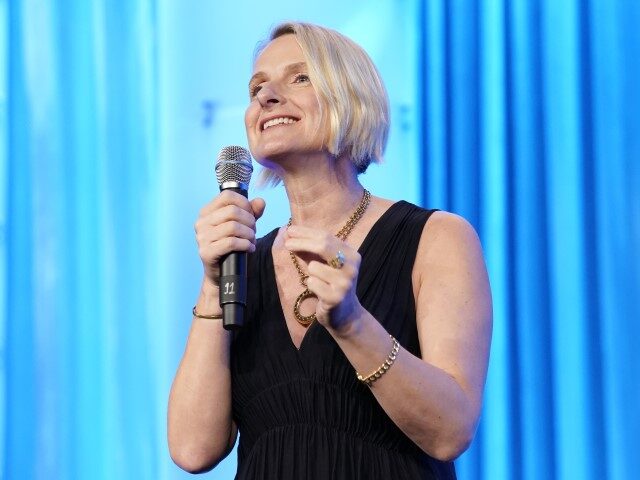The insufferable Elizabeth Gilbert, author of Eat, Pray, Love, put on one of the grossest displays of virtue signaling I’ve seen since last week, which is saying a lot when CNNLOL’s chief election-meddler Jake Tapper still walks the earth.
The multimillionaire pulled her latest book from publication to show solidarity with America’s Latest New Thing—which is blind allegiance to Ukraine straight into “Armageddon? So be it.”
The Snow Forest is set in 1930s Siberia during the Soviet era and has absolutely nothing to do with Ukraine or the ongoing war in Ukraine. Gilbert described the novel as the “dramatic story of one wild and mysterious girl in the pristine wilderness and of the mystical connection between humans and the natural world.”
But after some online scolds criticized the writer for publishing a novel set in Russia during The Latest New Thing, Gilbert decided to exploit the opportunity to play the heroine of her own life story. In a video posted online this week, she said the outpouring of “anger, sorrow, disappointment, and pain” from Ukraine readers led her to pull the novel from publication.
“It is not the time for this book to be published,” Gilbert said. “And I do not want to add any harm to a group of people who have already experienced, and who are continuing to experience, grievous and extreme harm.”
Important announcement about THE SNOW FOREST. Please note that if you were charged for your pre-order, you will be fully refunded. Thank you so much. pic.twitter.com/OAEmrjtfJx
— Elizabeth Gilbert (@GilbertLiz) June 12, 2023
Because she’s already a millionaire many times over, Gilbert can afford to pose as a Pretend Heroine. She knows there’s no downside to delaying publication. Ah, but the upside… That’s what she has to gain. Without a single sacrifice, she can look selfless, brave, noble, loyal, and to hell with the grotesque precedent she’s set.
Really, it’s now wrong to tell a story set in Russia?
What kind of precedent is this fascist Gilbert setting? How would you like to be a struggling novelist, screenwriter, or filmmaker three years into a project set in Russia—you know, but one of those artists who is not worth millions?
What’s next — in fealty to the Latest New Thing, will we ban Dostoevsky? Oh, wait, we already did that.
Will we ban Russian cats? Oh, wait, we already did that.
Elizabeth Gilbert “sacrificing” her novel to show solidarity with Ukraine is about as impressive as my latest news: “Until Russia is expelled from Ukraine and Vladimir Putin is on trial in the Hague for war crimes, I will not drink vodka and watch Doctor Zhivago. I might do both separately but never together.”
Well, for once, there is some good news in all this stupidity. Gilbert’s grotesque, simpering, transparent, mercenary mewling has backfired. The left-wing organization PEN, which “stands at the intersection of literature and human rights to protect free expression,” actually released a statement rebuking Gilbert:
It is regrettable that Elizabeth Gilbert felt it necessary to delay the publication of a novel set in Russia. Ukrainians have suffered immeasurably, and Gilbert’s decision in the face of online outcry from her Ukrainian readers is well-intended. But the idea that, in wartime, creativity and artistic expression should be preemptively shut down to avoid somehow compounding harms caused by military aggression is wrongheaded. … The publication of a novel set in Russia should not be cast as an act exacerbating oppression. Fiction and culture are essential to supporting mutual understanding and unleashing empathy. The choice of whether to read Gilbert’s book lies with readers themselves, and those who are troubled by it must be free to voice their views. We hope Gilbert might reconsider and we urge others to rally around the on-time publication of her book and the principle that literature and creativity must not become a casualty of war.”
Novelist Kat Rosenfield also saw right through Gilbert:
This type of coordinated effort to torpedo a book before it’s ever been published is a familiar specter in the literary community, whose most influential members are often both extremely online and extremely prone to jumping aboard whichever ostensibly-progressive bandwagon is gathering steam at any given moment. In the world of young adult (YA) fiction, where this type of pressure campaign was invented and refined, a single outraged tweet or post could kick off a maelstrom of righteous indignation, one often amplified by authors themselves. There’s a bucket-of-crabs dynamic to these controversies; in YA, previously-unknown authors could gain a boost in visibility by aligning themselves with cancellation-happy influencers (or, for that matter, take out a competitor by way of seeding rumors that their book was politically incorrect). Unsurprisingly, one of the top Goodreads critics of Gilbert appears to be an author of fantasy novels herself.
As a child of the 1970s and 80s, as an American who came of age during two of the freest decades in American history, two decades where the lessons of McCarthyism and blacklists were pounded into us, I hardly recognize a country where artists and politicians are disappeared over opinions Barack Obama held less than a decade ago. What’s truly obscene are those self-fascists out there blacklisting their own work, censoring themselves in the hope it will turn them into virtue-signaling martyrs.
The narcissism is toxic.

COMMENTS
Please let us know if you're having issues with commenting.